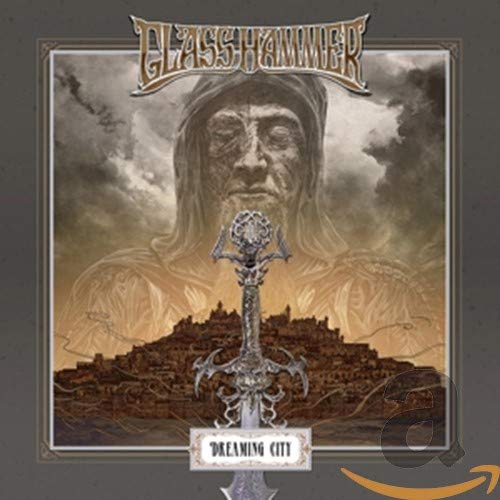Originality is a tough row to hoe. Not only is it appallingly easy to “allow” overused motifs and plot elements into your work without knowing it, it’s just as easy – and even more deadly – to go “too far,” and thus produce something so bizarre that the audience cannot find anything in it to enjoy. Anyone who’s tried to find something to enjoy in the resolutely non-harmonic works of Schonberg or the completely aleatoric and non-musical “compositions” of John Cage could tell you.
So when a multiply accomplished composer, accustomed to building adventurous music around and atop a great work of fantasy, goes looking for a genuinely new world to explore and comes away disheartened, I can easily understand his frustration.
If you know Glass Hammer, you know Steve Babb. Steve and keyboard wizard Fred Schendel have been making adventurous and inspiring music for more than two decades. Their oeuvre has made frequent use of the fantasies of J. R. R. Tolkien and C. S. Lewis for narrative inspiration and focus. The results have been all but uniformly stupendous. Unfortunately, those writers have let us all down by dying, which has imposed a limit on the breadth of their work.
Some time ago, Steve decided that it was time to try a completely original composition: one based on his own written work. The result was an impressive CD titled The Inconsolable Secret. Steve himself wrote the stories that underpin the compositions on that CD. The combination was impressive, to put it mildly.
But as Steve and Fred will readily tell you, time marches on:
Steve sought a new fantasy upon which to build a fresh composition. Whether he was unable to find enough inspiration in existing novels, or he simply wanted to exercise his own narrative gifts as he had in The Inconsolable Secret, he decided to found it upon a tale of his own imagining – and the result is upon us:

As usual with Glass Hammer, the music is complex and compelling. This is not “background music;” it must be actively listened to, with the liner notes in hand (and one’s reading glasses on) for maximum appreciation and enjoyment. Moreover, the embedded story, which refers to a novel I’d never heard of, tantalized me. I went to Amazon intending to purchase it regardless of price…and could not find it.
What’s this? Steve has employed a novel not for sale at Amazon? Surely something is amiss here. But not all my prodigious Google Fu could find the merest trace of this mysterious work, titled Skallagrim And The Dreaming City.
There was a mystery to be solved! So I took it to the Fortress’s resident mystery expert: the C.S.O., a.k.a. my wife Beth. She had as little knowledge of the book as I, and had no better luck locating it online. But she did make a useful suggestion:
Oh. Right. So that’s what I did. And Steve replied thus:
I wanted it to look as if [Dreaming City] was inspired by an obscure old sword and sorcery paperback I had read.
So I made up the name of the book and put it in the liner notes along with illustrations.
It’s really all about just giving the album a feel.
But always in the back of my mind I had imagined that I would actually [write] it. I have begun it and I am about 10,000 words in.
Ultimately it would be about the size of an old Elric paper back maybe with two stories in it.
What do you think?
(In case you’re not acquainted with them, the stories of Elric of Melniboné by Michael Moorcock can be found at Amazon.)
I immediately wrote back to Steve to encourage the project. From his previous narrative efforts and the material on Dreaming City, it will be a smash, guaranteed to delight any fan of sword & sorcery fantasy. And for now, we have the CD: a narratively structured concept-album as imaginative and compelling as anything in Glass Hammer’s oeuvre to date, including its previous high points Lex Rex and Valkyrie.
Highly recommended.
No comments:
Post a Comment